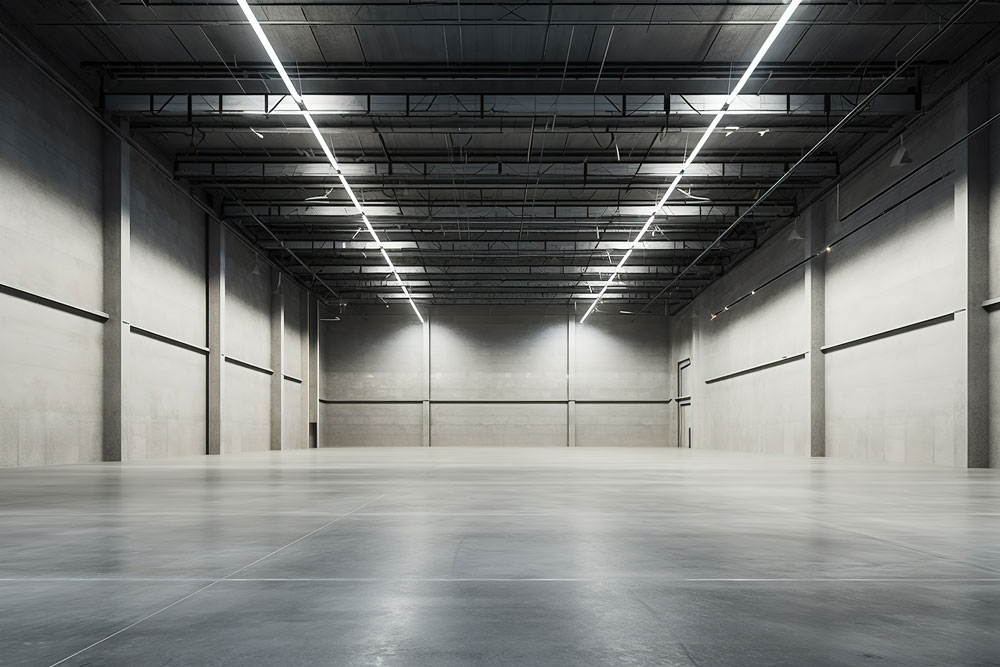How To Clean Concrete Floors
 CONTENTS
CONTENTS
- The importance of keeping your concrete floor clean
- How do you clean concrete floors
- How to clean up spills on concrete
- How to keep your concrete floor clean and tidy
- Book your factory clean today
Dirt, dust, and unsightly stains can make your factory an unproductive, dangerous place. Professional cleaners can keep your entire factory spick, span, and sanitary, and restore your concrete floor to pristine condition.
At ICE Cleaning, we offer our factory cleaning services nationwide. Our 360-degree factory cleaning service can help you stay on top of every workplace requirement and regulation.
Keep reading to learn more about the challenges of cleaning concrete floors and how to keep yours clean.
The importance of keeping your concrete floor clean
Keeping a factory or warehouse's concrete floor spotless is more than just an aesthetic choice - it’s about maintaining safety and efficiency. A clean floor reduces the risk of accidents, as spills can lead to slips and falls. Moreover, it can prevent equipment from malfunctioning due to dust build-up.
A pristine environment also upholds health standards. Dust and debris on floors may contribute to poor air quality, affecting workers' respiratory health. It even has the potential to impact product quality if contaminants are not controlled properly.
Furthermore, regular cleaning extends the lifespan of concrete flooring by removing substances that might cause erosion over time.
Clean floors enhance operational efficiency, too. When pathways are clear and marking lines visible, it helps workflow move faster because employees are not dodging obstacles or guessing where storage zones end.
An unclean, untidy factory can be off-putting for visitors, such as clients, as well, who may not want to continue to work with you in the future based on the state of your workplace. You can learn more about the importance of keep your factory clean in this blog.
How do you clean concrete floors
Cleaning concrete floors in a factory setting is no small feat. The sheer size and frequent use of these areas mean they get dirty fast.
The first step to keeping your concrete floor clean is regular maintenance. Sweeping daily will help remove dirt and debris that can scratch or mark the surface over time. A quality bristle brush does wonders for dislodging tougher grime before it settles.
Damp mopping weekly with plain water helps too but be careful: excessive moisture can cause problems like mildew growth on certain types of industrial flooring.
If spills happen, a pH-neutral cleaner should be your go-to choice for spot cleaning stains without damaging the integrity of the floor's sealant or finish. It’s key to act quickly as leaving spills unattended may lead to more severe staining.
For deep cleans or preparing floors prior to sealing them, mechanical methods like power washing or scrubbing machines are ideal. Professional cleaners will have the specialist chemicals and high-powered equipment as well as the training to safely clean your floor.
Should you attempt it yourself, you could cause damage to the floor, such as using too strong a water force or putting your health at risk when incorrectly using a dangerous cleaning agent.
How to clean up spills on concrete
Concrete is porous so it absorbs liquids quickly which can lead to staining and even structural damage if not addressed promptly. Moreover, in a workplace like a factory or warehouse where chemicals and fuels are common, the hazards increase exponentially.
Chemical spills such as acids or alkalis react with the calcium carbonate in concrete leading to erosion over time. This weakens the structure and could create costly problems down the line. Safety becomes a major concern too because spills can be a tripping hazard for employees.
Fuel spills present their own set of challenges since they often contain volatile organic compounds (VOCs) that evaporate into the air, affecting indoor air quality. They are also fire hazards.
If you encounter such spillages in your workspace, do not take matters into your own hands unless you have proper training. Specialised equipment is needed to safely remove these substances without causing harm to yourself or further damaging the floor surface.
Hazardous spills should always be left to trained specialist cleaners that have the equipment and personal protective equipment to safely and thoroughly clean them up. If you have spill kits stored on site, only people trained to use them should clean up the spill.
How to keep your concrete floor clean and tidy
You should have regular deep cleaning sessions to get rid of tough stains and restore shine to dulled areas. These sessions can remove potentially harmful chemicals that could affect air quality inside your facility, too.
To maintain your concrete floor, you should also consider having it sealed. The sealer acts as a protective layer, reducing the impact of heavy machinery or foot traffic on your factory's flooring. Cleaning sealed concrete floors becomes much easier than unsealed ones. A simple mop or sweep will usually suffice for daily cleaning tasks.
Sealant can even prevent dust from forming at the surface level and provide ongoing resistance against deterioration caused by moisture penetration or chemical spills. You can find out more about the different ways to keep your factory clean in this blog.
Book your factory clean today
Our technicians have access to state-of-the-art cleaning equipment that enables a deep, efficient clean. We operate 24/7, 365 days a year, and can carry out services outside of your operating hours to avoid disruption.
Give our team a ring on 0208 066 0360 or send an email to enquiries@icecleaning.co.uk to find out more about our factory cleaning services.

Speak with me today,
I’m here to help
By asking you a few questions either via phone or email I can immediately provide a realistic estimation of the cost.
You’re in good company. We’ve cleaned for the following commercial clients… View all

Why choose us?
- Cater to a wide variety of cleaning situations
- Nationwide coverage, available 24/7
- Cater to commercial and domestic clients
- Free survey provided prior to quotation
- Emergency response team
- Offer a bespoke service designed to suit all your needs
- All technicians hold professional health and safety qualifications, including BICSc, IOSH, Dewpoint Professional & Safe Contractor
We’re fully accredited
We place best practise, professional expertise and health and safety at the core of our business. We’re fully compliant with all legal obligations. You can view a list of our accreditations below, or visit our Health & Safety page for more information.




-RGB-small.1707319151.jpg)



























